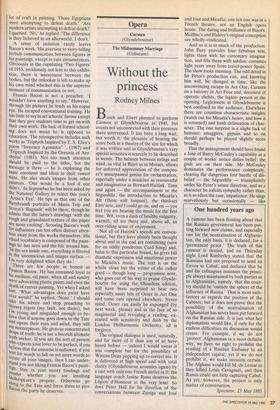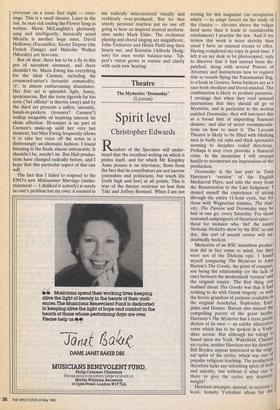Opera
Carmen (Glyndebourne)
Without the princess
Rodney Milnes
Busch and Ebert planned to perform Carmen at Glyndebourne in 1940, but events not unconnected with their presence there intervened. It has been a long wait, but worth it: the pleasure of hearing the score both in a theatre of the size for which it was written and in Glyndebourne's very special acoustics is scarcely to be described in words. The balance between strings and wind, as vital in Bizet as in Mozart, allows for unforced appreciation of the compos- er's unsurpassed genius for orchestration, especially under a musician as resourceful and imaginative as Bernard Haitink. Time and again — the accompaniment to the Seguedille, the introduction to Micaela's Air (those soft timpani), the third-act Entr'acte, and I could go on, and on — you feel you are hearing the music for the first time. Wit, even a dash of healthy vulgarity, warmth, all are there and, above all, an over-riding sense of enjoyment.
Not all of Haitink's speeds are conven- tional, but they have plainly been thought about and in the end are convincing (save for an oddly ponderous Card Song) and, balm to this particular breast, he gives full dramatic expression and emotional power to Micaela's music. The text is on the whole clean but the writer of the rather good — though long — programme note, who goes out of his way to praise Glynde- bourne for using the Choudens edition, will have been surprised to hear two especially nasty bits of Oeser in Act One and some cuts opened elsewhere. Never mind, Oeser can easily be expunged (by next week, please) and in the face of so magisterial and revealing a reading, ex- ecuted with sensitivity and dash by the London Philharmonic Orchestra, all is forgiven.
The original dialogue is used, naturally, and far more of it than any of us have heard before - indeed I would swear it was complete but for the possibility of Winton Dean popping up to correct me. It is delivered at high speed and with total clarity (Glyndebourne acoustics again) by a cast with only one French native in it: the language coach Janine Reiss deserves the Legion d'Honneur at the very least. So does Peter Hall for his direction of the conversations between Zuniga and Jose and Jose and Micaela: one felt one was in a French theatre, not an English opera house. The daring and brilliance of Bizet's, Meilhac's and Halevy's original conception are wholly vindicated.
And so it is in much of the production. John Bury provides four fabulous sets, lights them with his customary imagina- tion, and fills them with subfusc costumes light years away from travel-poster Spain. The show looks stunning. The odd detail in Sir Peter's production can, and knowing him will, be changed in time, like the unconvincing escape in Act One, Carmen on a balcony in Act Four and, dreariest of operatic cliches, the legless person at the opening. Leglessness at Glyndebourne is best confined to the audience. Elsewhere there are countless characteristic insights (watch out for Micaela's bailer, and how it is returned) and fresh delineation of char- acter. The one surprise is a slight lack of humour: smugglers, gypsies and so on should perhaps be played slightly more broadly.
That the management should have found a Jose of Barry McCauley's capability at a couple of weeks' notice defies belief: the gods are on their side. Mr McCauley dominates the performance completely, clearing the dangerous first hurdle of dis- belief — the Seguedille — triumphantly under Sir Peter's astute direction, and as a character he solicits sympathy rather than, as is so often the case, impatience. He sings marvellously but occasionally — like everyone on a tense first night — over- sings. This is a small theatre. Later in the run, he may risk ending the Flower Song as written. Marie McLaughlin's gloriously sung and intelligently, heroically acted Micaela is another huge asset. David Holloway (Escamillo), Xavier Depraz (the French Zuniga) and Malcolm Walker (Morales) are first-rate.
But oh dear, there has to be a fly in this pot of succulent ointment, and there shouldn't be. Maria Ewing has everything for the ideal Carmen, including the crossword-setter's favourite commodity, It', in almost embarrassing abundance. Her first act is splendid: light, funny, spontaneous. But she turns tigerish far too soon (`bel officier' is thrown away) and by the third act presents a sullen, sarcastic, hands-in-pockets (trousers? Carmen?) trollop incapable of inspiring interest let alone affection. Ill-temper is no part of Carmen's make-up until her very last moment, but Miss Ewing frequently allows it to take her voice off the notes in a distressingly un-idiomatic fashion. I found listening to the finale almost unbearable. It shouldn't be, needn't be. But Hall produc- tions have changed radically before, and I hope that this particular aspect of this one will.
The fact that I failed to respond to the ENO's new Midsummer Marriage (under- statement — I disliked it actively) is surely no one's problem but my own: it seemed to
me radically misconceived visually and recklessly over-produced. But let that utterly personal reaction put no one off going to hear an inspired musical perform- ance under Mark Elder. The orchestral playing and choral singing are magnificent, John Treleaven and Helen Field sing their hearts out, and Sosostris (Alfreda Hodg- son) for once works balance-wise. Tip- pett's vision grows in stature and clarity with each new hearing.



















































 Previous page
Previous page